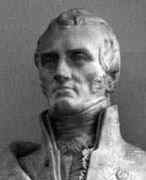◀ ▲ ▶History / 18th-century / Person: Navier, Claude Louis Marie Henri
Person: Navier, Claude Louis Marie Henri

Claude-Louis Navier was a French mathematician best known for the Navier-Stokes equations describing the behaviour of a incompressible fluid.
Mathematical Profile (Excerpt):
- He was considered the leading civil engineer in France and he certainly gave Navier an interest in engineering.
- Despite encouraging Navier to enter the École Polytechnique, Gauthey seems not to have been that successful in teaching Navier, who may just have been a late developer, for he only just scraped into to École Polytechnique in 1802.
- However, from almost bottom place on entry, Navier made such progress in his first year at the École Polytechnique that he was one of the top ten students at the end of the year and chosen for special field work in Boulogne in his second year.
- During this first year at the École Polytechnique, Navier was taught analysis by Fourier who had a remarkable influence on the young man.
- Fourier became a life-long friend of Navier as well as his teacher, and he took an active interest in Navier's career from that time on.
- In 1804 Navier entered the École des Ponts et Chaussées and graduated as one of the top students in the school two years later.
- In that process, on the basis of his own research in theoretical mechanics, Navier added a somewhat analytical flavour to the works of Gauthey.
- That, in combination with textbooks that Navier wrote for practicing engineers, introduced the basic principles of engineering science to a field that previously had been almost completely empirical.
- Navier took charge of the applied mechanics courses at the École des Ponts et Chaussées in 1819, being named as professor there in 1830.
- His ideas for teaching were not shared by all, however, and soon after his appointment to the professorship at the École Polytechnique Navier became involved in a dispute with Poisson over the teaching of Fourier's theory of heat.
- Navier is remembered today, not as the famous builder of bridges for which he was known in his own day, but rather for the Navier-Stokes equations of fluid dynamics.
- He gave the well known Navier-Stokes equations for an incompressible fluid in 1821 while in 1822 he gave equations for viscous fluids.
- We should note, however, that Navier derived the Navier-Stokes equations despite not fully understanding the physics of the situation which he was modelling.
- Navier received many honours, perhaps the most important of which was election to the Académie des Sciences in Paris in 1824.
- Navier appointed him as one of his assistants at the École Polytechnique and this connection was to see Navier become an ardent supporter of the ideas of Comte and Saint-Simon.
- Navier believed in an industrialised world in which science and technology would solve most of the problems.
- From 1830 Navier was employed as a consultant by the government to advise on how science and technology could be used to better the country.
Born 10 February 1785, Dijon, France. Died 21 August 1836, Paris, France.
View full biography at MacTutor
Thank you to the contributors under CC BY-SA 4.0! 

- Github:
-

- non-Github:
- @J-J-O'Connor
- @E-F-Robertson
References
Adapted from other CC BY-SA 4.0 Sources:
- O’Connor, John J; Robertson, Edmund F: MacTutor History of Mathematics Archive
